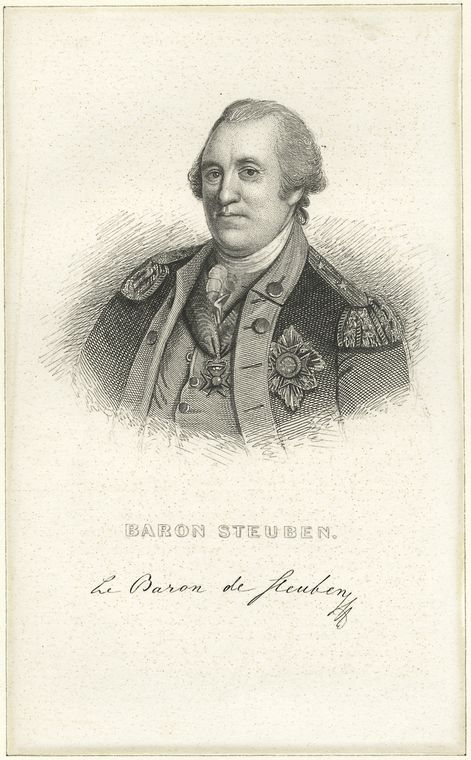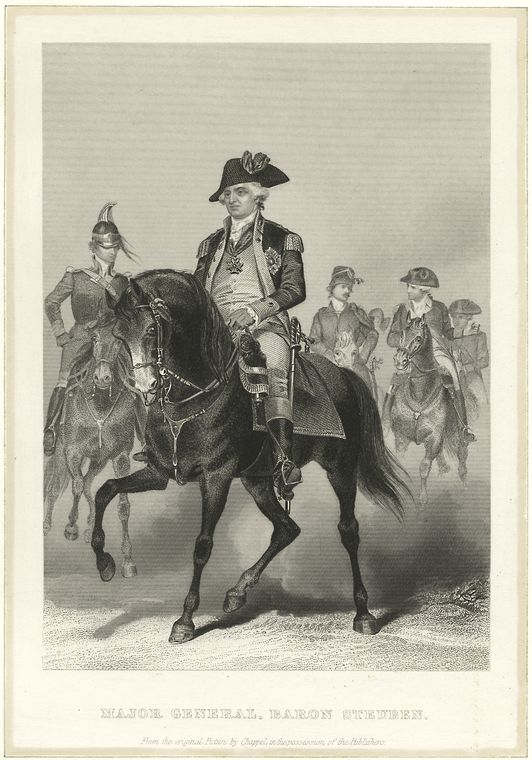The Drillmaster: Biography of Baron de Steuben
 Von Steuben has been a figure of pop Revolutionary War mythology for too long. This excellent 2008 bio places him firmly within the context of the 1700s. With family connections close to the Hohenzollern Monarchy, Steuben should have been placed to rise pretty high in the Prussian officer hierarchy. He saw active service in the beginning of the Seven Years War and witnessed the bloodshed of the first heavy battles of the war at Prague in 1756. He saw further service commanding Free Batalion Mayer, a unique command that subsequently suited his future employment very well in America.
Von Steuben has been a figure of pop Revolutionary War mythology for too long. This excellent 2008 bio places him firmly within the context of the 1700s. With family connections close to the Hohenzollern Monarchy, Steuben should have been placed to rise pretty high in the Prussian officer hierarchy. He saw active service in the beginning of the Seven Years War and witnessed the bloodshed of the first heavy battles of the war at Prague in 1756. He saw further service commanding Free Batalion Mayer, a unique command that subsequently suited his future employment very well in America.
There has been some question about Steuben's baronial title. The book shows that he came from a minor Prussian Junker family, of the kind that primarily served in the army. Did this make him a real baron? Well, Steuben liked to think so! His titles were somewhat exaggerated by Franklin in Paris in order to make him sound more important. Steuben was aware of this and tried several times to reveal his more humble origins. Since by this time he was drilling Washy's army and improving its ability to deploy on the battlefield few could have cared about his background. Steuben's abilities were apparent whether he had noble rank or not. To the army he was simply known as the Baron. This remains so today.

Footloose in Europe in a post war environment Steuben struggled to use his numerous connections to find some gainful military employment. None had anything to offer him. At wits end he finally travels to Paris to be interviewed by Benjamin Franklin for possible service in an obscure war with an unknown army. The rest they say is history. Steuben arrives just in time to whip the ragtag American army into shape at Valley Forge. Appalled by what he sees, Steuben nevertheless gains the confidence of His Excellency, George Washington who knows little how to train troops in European warfare. He devises a special, shortened drill sequence based on the Prussian manual that becomes the army's famed Blue Book. Up until this time the Rebel army was virtually ignorant on how to maneuver on the battlefield. Even at Princeton, Washy's notable victory right after Trenton, Rebel units deployed single file Indian fashion, a time consuming process which could have cost them the battle had the British been less outnumbered. Although any competent officer of European background could have created such a manual for the Rebel army, Steuben does it with aplomb and even brilliance. He combines the antics of a comedian and martinet quickly gaining the confidence of the raw American troops. Now his previous service in the Seven Years War commanding Free Batalion Mayer comes in handy. These were ragtag Prussian skirmishers quickly thrown together to oppose the very active Austrian Croats & Pandors who came from the border regions of the Empire and were expert at Petite-Guerre. Having fought the ilregular Turks for many generations in such fashion. Steuben's exposure to this mode of fighting was uniquely suited to the American army which was also unconventional. In this way he could combine formal European drill with skirmish and Light Infantry tactics. Exactly what was needed at Valley Forge.

The book concludes with an interesting account of The Baron's campaign in Virginia in 1780-81. Little studied in all its details. Here Steuben had to deal with a very difficult situation. British encroachment was not adequately met with the resources on hand. Steuben had to work with Thomas Jefferson who was governor, but true to his form could never deliver on the promises he made for supplies and men. His Southern manner baffled the Baron. Meanwhile the British had a free hand pillaging and raiding much of the colony. Even the infamous Benedict Arnold appeared on the scene commanding a small, mobile force of British troops. For a time Arnold caused much damage to Richmond and other locales. It was all too much for Jefferson's retiring manner and Steuben seemed helpless to do anything about the situation.
One bright moment for the Baron saw him fight a creditable action with Militia against General Philips at Blanford just outside Petersburg. This action, little known today, illustrates that Steuben could command troops well, and American ones no less. But his commission as a staff officer within the Continental army never allowed him the opportunity to exercise these abilities. Rival American and European officers were intent on preventing this as well. Lafayette and others often bad-mouthed him behind his back. The French Marquis came across as a much more likeable personality. Still, he never could have accomplished what Steuben did administrative-wise, and his command abilities were limited at best. Cornwallis nearly destroyed Le Marquis' small command at Greensprings fought right before Yorktown. Another little known incident of the campaign. Popularity won out over ability, something common to American outlook even then. Continued difficulties with Jefferson and other officials in Virginia damaged the Barons reputation somewhat. But Washington's support never wavered. In the end the Baron was able to assume nominal command of a Division of American troops at Yorktown. This was a personal satisfaction for him to show the French alliance what he had been able to accomplish drill-wise with the American army.
At the end of the Rev War Steuben was hopeful of getting employment with the French army, but this like so many of his plans did not work out. He was not keen to stay in America as he knew it wouldn't be a restful retirement. Coming on in years now the Baron was still owed money by a reluctant and cash-starved Congress. He had to fight for every dime. In the end he would die in relative obscurity in upstate New York. His legend lives on and he has come to represent the special German-American experience in this nation. He was larger than life, controversial, but probably the right man at the right time for what was needed. This new bio, one of the few ever written about his life provides a lively and informative account. At last we can separate the man from the myth when we celebrate him on Steuben Day Parade in New York City.
Read E-Books with SimplyE
 With your library card, it's easier than ever to choose from more than 300,000 e-books on SimplyE, The New York Public Library's free e-reader app. Gain access to digital resources for all ages, including e-books, audiobooks, databases, and more.
With your library card, it's easier than ever to choose from more than 300,000 e-books on SimplyE, The New York Public Library's free e-reader app. Gain access to digital resources for all ages, including e-books, audiobooks, databases, and more.
If you don’t have an NYPL library card, New York State residents can apply for a digital card online or through SimplyE (available on the App Store or Google Play).
Need more help? Read our guide to using SimplyE.